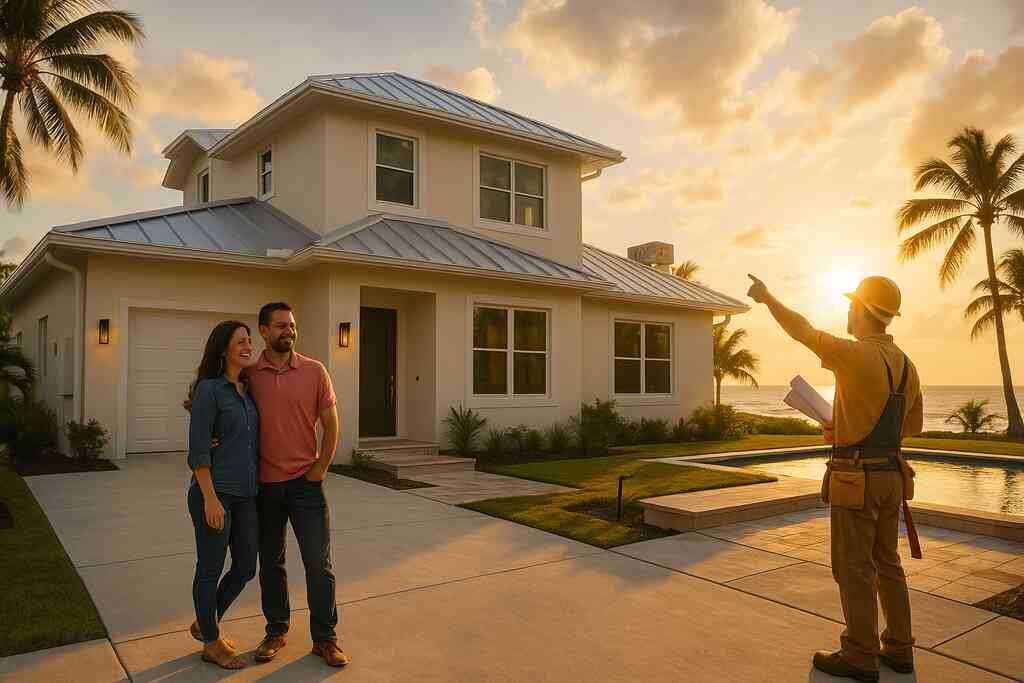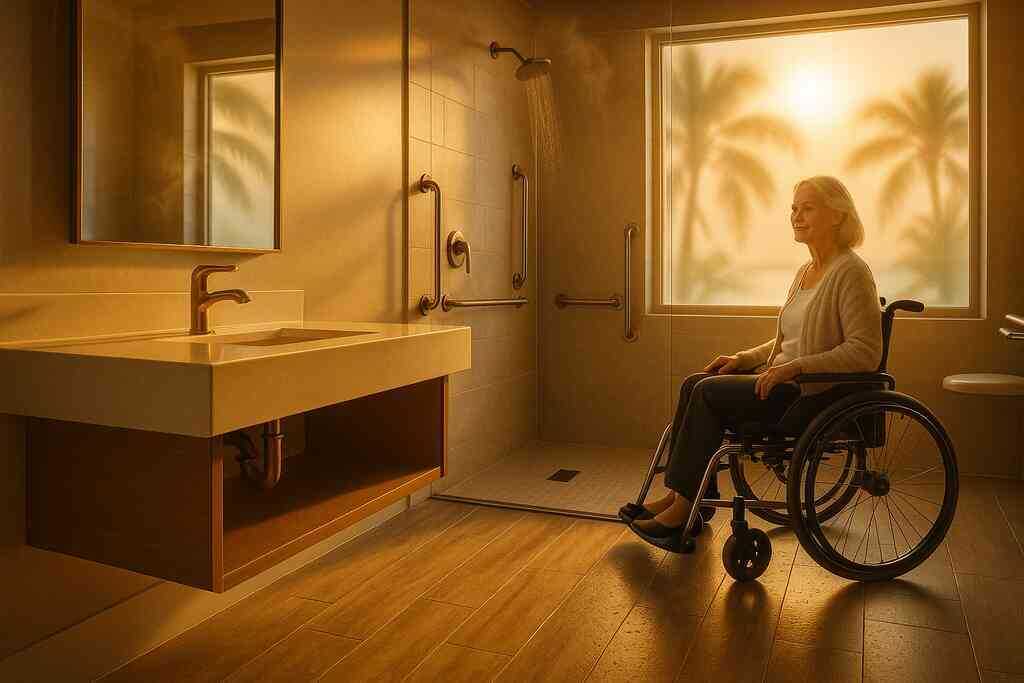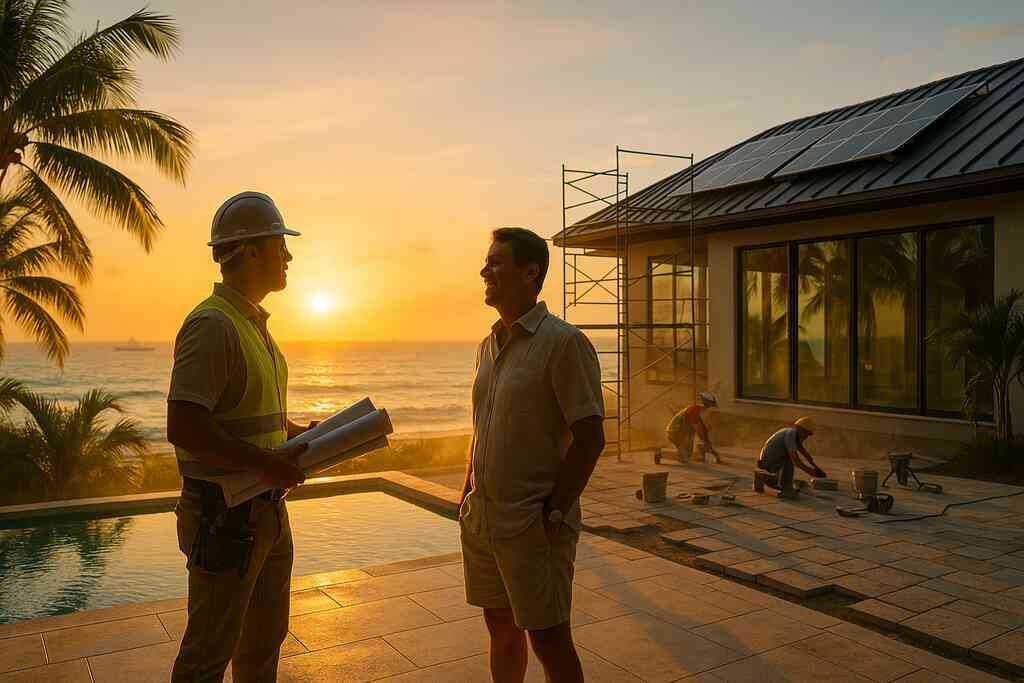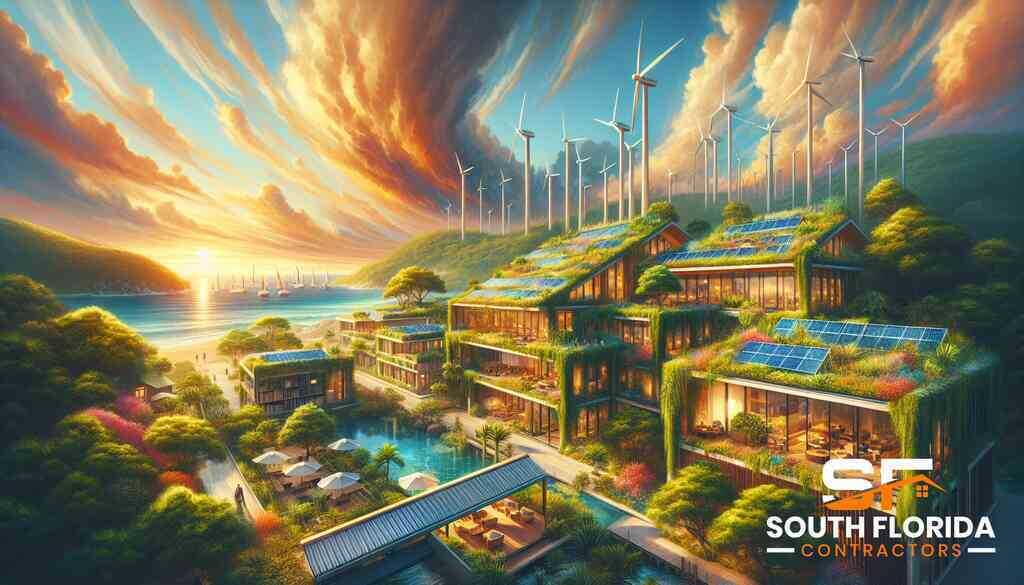
The Ultimate Guide to Eco-Friendly Builds in Levy County
August 13, 2025
Introduction: The New Frontier of Building
Reimagining Construction in Levy County
Levy County is rapidly transforming into a hotbed for eco-friendly construction, setting a new standard in sustainable building practices near West Palm Beach. Nestled within Florida’s enchanting landscapes, this region offers an ideal canvas for innovative eco-friendly construction practices in South Florida. Recognizing the pressing need for green designs and energy-efficient homes, South Florida Contractors are pioneering remarkable advancements in this domain. Collaborating with visionary architects and builders, these efforts are paving the way for a revolutionary shift in how homes and commercial spaces are constructed, ensuring reduced environmental impact and optimized resource use.
From Concept to Sustainable Reality
Turning a sustainable building concept into a reality requires meticulous planning and execution, particularly in a place like Levy County. The journey starts with an intricate blueprint that embodies eco-conscious materials for sustainable architecture and practices. Stakeholders, including designers, engineers, and contractors, come together to realize energy-efficient features in South Florida homes while minimizing carbon footprints. The use of technologies like passive solar design practices aids homes in conserving energy, making these constructions both innovative and practical. As South Florida embraces these trends, the county serves as a model inspiring others to adopt green home design in Levy County.
The Eco-Conscious Revolution
The construction industry in Levy County is at the forefront of the eco-conscious revolution, deeply committed to creating a sustainable future. The push for eco-conscious projects involves integrating renewable energy systems in Levy County that harness solar and wind power, thus reducing dependency on fossil fuels. These efforts contribute significantly to building a low carbon footprint construction solutions infrastructure. This revolution extends beyond individual projects, promising a future where eco-friendly sites are the norm rather than the exception. As the demand for sustainable and resilient buildings increases, Levy County stands tall as a beacon of progress in South Florida’s green construction landscape.
Mastering Sustainable Architecture
Harnessing the Power of Renewable Energy
In Levy County, harnessing renewable energy pivots eco-friendly construction towards a greener future. With abundant sunlight and favorable wind conditions, installing solar panels and wind turbines offers a practical solution for reducing reliance on non-renewable energy sources. Renewable energy systems in Levy County are setting a benchmark in sustainable building solutions by integrating photovoltaic systems into residential and commercial structures alike. This integration not only aids in lowering energy bills but also enhances the overall energy efficiency of buildings, thereby making them more sustainable and environmentally friendly. As these systems gain traction, the focus remains on maximizing energy output while minimizing environmental compromise, a balance crucial for sustainable architecture.
Innovative Eco-Friendly Building Practices
The use of innovative eco-friendly building practices is imperative to advancing sustainable architecture. Incorporating eco-conscious materials for sustainable architecture results in constructions that are not only durable but also environmentally responsible. These state-of-the-art methodologies include using recycled building materials that significantly reduce the ecological impact of construction. Moreover, implementing strategies like passive solar design encourages natural climate regulation within buildings, further decreasing the reliance on artificial heating and cooling systems, especially near Delray Beach. As South Florida Contractors engage in these practices, they exemplify a proactive approach to nurturing a sustainable construction landscape, one that balances modern living needs with the integrity of natural resources.
The Low Carbon Footprint Paradigm
Pioneering low carbon footprint construction solutions is at the heart of transforming Levy County’s building codes and norms. As awareness of environmental impacts deepens, developers are increasingly opting for designs that minimize carbon emissions. This involves both the choice of low-impact materials and the strategic planning of construction processes. By incorporating green roofs and promoting efficient land use, buildings can substantially lower their carbon footprint. The green roof technology in South Florida serves not only as an aesthetic advantage but also as a functional aspect that contributes to insulation and moisture management, enhancing a building’s environmental credentials. These practices confirm that a commitment to sustainability is not merely an option but a necessity for the future of construction in South Florida.
Eco-Conscious Material Selection
Unveiling the Potential of Recycled Materials
As the construction industry evolves towards a more sustainable future, the potential of recycled building materials in Florida is becoming increasingly significant. Utilizing materials such as reclaimed wood, recycled metal, and sustainable composites not only reduces construction waste but also lessens the demand for virgin resources. By prioritizing the use of these materials, South Florida’s construction companies can demonstrate their commitment to eco-friendly infrastructure development. This proactive approach not only curtails environmental degradation but also offers builders a cost-effective raw material solution, leading to innovative design possibilities that align with sustainable building practices near West Palm Beach.
Navigating Eco-Friendly Insulation Options
Choosing the right insulation is pivotal for an energy-efficient home, and today, builders have access to a range of eco-friendly insulation options. Materials like cork, sheep wool, and cellulose promise excellent thermal performance while being biodegradable and toxin-free. These options not only enhance indoor air quality but also maintain comfortable living conditions, reducing dependency on heating and cooling systems. For homeowners committed to sustainability, selecting eco-conscious insulation aligns with broader goals of achieving a low carbon footprint construction solutions infrastructure in the heart of South Florida.
The Rise of Natural Lighting and Optimization
Harnessing natural lighting remains a vital component of sustainable building design. Techniques that optimize natural light not only cut down on energy consumption but also enrich the aesthetic appeal of homes. Architectural designs incorporating large windows, translucent walls, and strategically placed skylights can flood interiors with light, transforming spaces while fostering energy savings. Embracing such innovations aligns with the county’s focus on eco-friendly construction practices in South Florida, setting a precedent for building techniques that harmonize aesthetic appeal with functional energy-saving measures. As the industry moves forward, integrating these elements can significantly bolster the environmental credentials of any residential or commercial project.
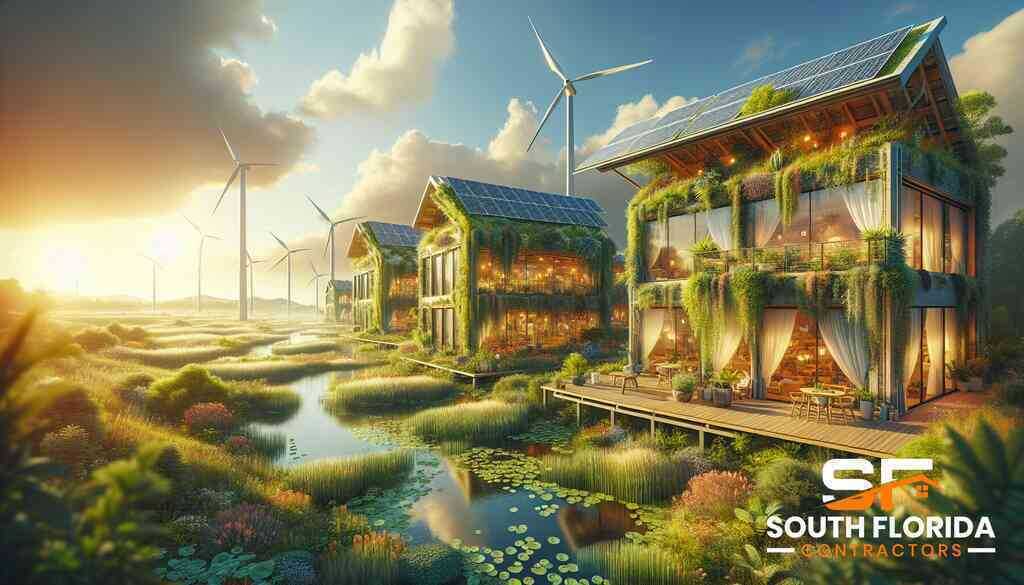
Revolutionizing HVAC and Energy Efficiency
Cutting-Edge HVAC Systems That Lead in Efficiency
The move towards sustainable building practices in South Florida places great emphasis on deploying cutting-edge energy-efficient HVAC systems. These systems are designed not only to regulate temperature more effectively but also to dramatically reduce energy consumption. By incorporating advanced heat exchangers, smart thermostats, and variable speed compressors, these HVAC systems offer unparalleled efficiency. Moreover, they contribute to the overall green architecture by minimizing the carbon footprint. As more South Florida contractors embrace these innovations, they’re setting a new precedent for energy conservation in coastal building designs, thus fortifying Levy County’s position at the forefront of eco-friendly infrastructure development.
Optimizing Energy Consumption in South Florida Eco-Homes
In optimizing energy consumption within South Florida eco-homes, the integration of renewable energy systems alongside efficient HVAC technologies is crucial. Solar and wind energy systems provide a sustainable power source that can complement these innovative HVAC solutions. The synergy between renewable energy and energy-efficient systems allows homeowners to enjoy a comfortable indoor environment with reduced energy costs. Additionally, strategies such as improved insulation and airtight construction help in achieving maximum energy retention, further enhancing the sustainability of these homes. Through these advancements, Levy County exemplifies a forward-thinking approach that other regions can emulate, contributing to the broader goal of sustainable living.
Leverage Eco-Smart Automation for a Sustainable Future
Eco-smart home automation presents an exciting frontier for enhancing sustainability within residential and commercial settings. By harnessing systems that intelligently manage HVAC operations, lighting, and appliance function, energy efficiency becomes significantly optimized. These technologies learn user preferences and adapt on the fly, ensuring that energy is only used when necessary. Incorporating eco-smart home automation not only elevates the user experience but also fortifies the sustainability of architectural projects, emphasizing the county’s commitment to reducing environmental impact. As these systems become more prevalent, they promise not only to transform how we interact with our built environments but also to forge pathways to a carbon-neutral future.
The Green Roof Movement
Green Roof Technology: Beyond the Basics
Green roof technology has become a linchpin in sustainable architecture, particularly in regions like South Florida that are embracing eco-friendly building innovations. This trend involves more than just covering roofs with greenery; it’s about creating an urban ecosystem that improves air quality and reduces the heat island effect typical in densely constructed areas. The technology behind green roof technology in South Florida encompasses the use of advanced waterproofing techniques, root repellent systems, and high-performance growing mediums, making it a robust option for homeowners seeking sustainable alternatives. In addition to enhancing biodiversity, green roofs contribute significantly to energy conservation by providing natural insulation, which in turn reduces the reliance on artificial cooling systems. This aligns seamlessly with the goals of eco-friendly infrastructure development, paving the way for a landscape where urban development coexists harmoniously with nature.
Exemplars of Sustainable Landscaping Practices
In the realm of sustainable construction, landscaping plays a crucial role in offsetting the ecological footprint of new builds. Exemplary Delray Beach construction innovations encompass incorporating native plant species that require minimal irrigation and fertilization, thus preserving local water resources. These practices are not only environmental but are also cost-effective, reducing the need for maintenance and artificial watering systems. Additionally, landscape designs that integrate bioswales and rain gardens allow for natural stormwater management, significantly lowering the risk of flooding in urban settings. By prioritizing these elements, South Florida contractors demonstrate their commitment to ecological balance and sustainability, achieving an aesthetic that is both functional and environmentally considerate. This movement towards sustainable landscaping reaffirms the importance of thoughtful planning and design as vital components of a broader strategy for achieving carbon-neutral building solutions near Miami.
Integrating Water Conservation Solutions
Incorporating water conservation solutions for eco-homes is essential in creating both sustainable and resilient buildings. Water-efficient systems such as rainwater harvesting, greywater recycling, and smart irrigation controls illustrate how modern construction can tackle resource scarcity while enhancing environmental stewardship. As more projects integrate these systems, the overall demand on municipal water supplies diminishes, which is especially beneficial in drought-prone areas. By linking water conservation initiatives with other sustainable practices like passive solar design, contractors ensure that eco-homes are not only energy-efficient but also self-sustaining in water management. This synergy reflects a promising future for construction innovations, where each element of design and function serves a greater ecological purpose. In doing so, Levy County continues to lead as a model of sustainability, showing that with strategic implementation, it’s possible to build an infrastructure that meets human needs without compromising natural resources.
Creating a Future with Carbon-Neutral Builds
Roadmap to LEED Certification and Beyond
Achieving LEED-certified builders in Levy County status is pivotal for fostering a greener, more sustainable construction landscape. The Leadership in Energy and Environmental Design (LEED) framework provides a comprehensive roadmap that encompasses various aspects of sustainable architecture. To earn this prestigious certification, projects must meet rigorous standards pertaining to sustainability, water efficiency, energy utilization, and material selection. Builders committed to these principles go beyond basic energy-efficient solutions, striving for a holistic approach that influences every layer of construction, from renovations in Boynton Beach. By adhering to LEED standards, construction companies in Levy County set a benchmark for eco-friendly practices, inspiring neighboring regions to follow suit, such as projects in South Florida. This dedication not only boosts environmental stewardship but also enhances property values, presenting an attractive prospect for potential clients seeking sustainable building solutions.
Exploring Carbon-Neutral and Sustainable Infrastructure
Exploring carbon-neutral building solutions near Miami is essential for future-proofing infrastructure against the challenges of climate change. The push towards carbon neutrality involves assessing and reducing greenhouse gas emissions through innovative design and construction techniques. This includes the adoption of renewable energy sources, advanced insulation technologies, and energy-efficient systems that collectively minimize carbon output. Sustainable urban planning incorporates nature-based solutions, such as green roofs and vertical gardens, which contribute to healthier living environments and offset carbon footprints. Developers who prioritize these strategies not only adhere to regulatory mandates but also actively participate in the global effort to combat climate change. As Miami and its environs aim for a sustainable infrastructure, Levy County emerges as a model region, demonstrating proactive approaches to carbon neutrality and setting the stage for a cleaner, greener future.
Incentivizing Renewable Energy Deployment
Incentivizing the deployment of renewable energy is a cornerstone in advancing eco-friendly infrastructure. Government policies and financial incentives play a vital role in encouraging homeowners and builders to invest in solar and wind energy systems. Tax credits, rebates, and grants make renewable energy installations more financially accessible, promoting widespread adoption. By incorporating renewable energy incentives, communities are incentivized to lower their carbon emissions and contribute to a sustainable energy grid. Moreover, this movement creates economic opportunities, fueling job growth within the green energy sector. As these initiatives gain momentum, South Florida stands poised to lead the charge toward a future powered predominantly by renewable resources. Levy County, with its commitment to eco-friendly construction, becomes a beacon of innovation, guiding the deployment strategies that further solidify the region’s ecological and economic resilience.
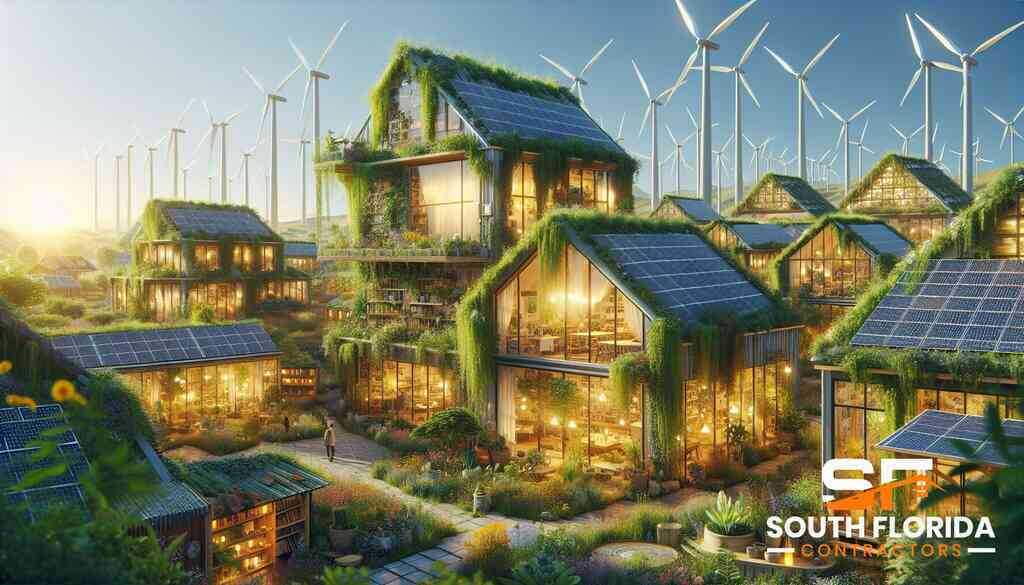
Conclusion: Building for Tomorrow
What Levy County Teaches the World About Sustainability
Levy County stands as a testament to the power and potential of eco-friendly construction, serving as a valuable model for sustainable building practices worldwide. Its successful incorporation of renewable energy systems, such as solar panels and wind turbines, underscores the importance of leveraging natural resources. This forward-thinking approach highlights the critical role of eco-friendly infrastructure development in achieving a greener tomorrow. As regions across the globe grapple with the challenges of environmental degradation and resource scarcity, Levy County offers insights into sustainable living that prioritize efficiency, eco-conscious material selection, and innovative construction techniques.
Steps Towards a Greener Tomorrow
Building a sustainable future requires deliberate action and collective effort. The journey begins with an emphasis on energy-efficient solutions, involving everything from cutting-edge HVAC systems to water conservation solutions for eco-homes. Implementing strategies like passive solar design and incorporating recycled materials are crucial steps in reducing our carbon footprint. Furthermore, embracing eco-smart home automation technologies can enhance energy management and the lifespan of resources. By championing these across construction projects, we create a cascading effect that promotes sustainability broadly, ensuring that the lessons of eco-friendliness are not confined to Levy County alone.
Levy County as a Beacon of Eco-Innovation
As Levy County continues to lead the charge for eco-friendly and sustainable development in South Florida, it becomes a beacon of eco-innovation for communities near and far. Its commitment to integrating green roof technology and exploring carbon-neutral building solutions sets a high standard for others to emulate. These efforts illustrate the possibilities of a future where construction and environmental stewardship go hand in hand. By championing change and inspiring action, Levy County encourages other regions to adopt similar measures, laying the groundwork for a global transformation towards a more sustainable future.
Frequently Asked Questions
Question: What steps do South Florida Contractors take to ensure eco-friendly construction in Levy County?
Answer: South Florida Contractors are committed to delivering eco-friendly construction solutions in Levy County by utilizing sustainable building practices and innovative techniques. This includes integrating renewable energy systems, such as solar panel installations and wind turbines, into residential and commercial projects. By prioritizing the use of eco-conscious materials and implementing low carbon footprint construction methods, they strive to reduce environmental impact while optimizing resource use. Their expertise in green roof technology and natural lighting optimization further emphasizes their dedication to creating energy-efficient homes.
Question: How do you incorporate sustainable architecture into your projects, as described in the blog ‘The Ultimate Guide to Eco-Friendly Builds in Levy County’?
Answer: In line with the principles outlined in ‘The Ultimate Guide to Eco-Friendly Builds in Levy County,’ South Florida Contractors implement sustainable architecture by carefully selecting materials that are recycled and eco-conscious. They embrace innovative building practices like passive solar design to minimize energy use and enhance natural climate regulation within structures. Their focus is on creating homes and commercial spaces that are both environmentally responsible and durable, ensuring that each project contributes positively to the eco-conscious revolution in the construction industry.
Question: What kind of eco-friendly insulation options do you recommend for Levy County homes?
Answer: For energy-efficient home features in Levy County, South Florida Contractors recommend using eco-friendly insulation materials such as cork, sheep wool, and cellulose. These materials offer excellent thermal performance and are biodegradable and toxin-free, resulting in improved indoor air quality. Such options help reduce the reliance on heating and cooling systems, which is crucial for maintaining a low carbon footprint in construction. By selecting the right insulation, homeowners can achieve a comfortable living environment while supporting sustainable building practices.
Question: How do South Florida Contractors ensure that their renewable energy systems are effective and financially viable for homeowners?
Answer: South Florida Contractors focus on harnessing renewable energy systems that are tailored for high energy output and low environmental impact. They guide homeowners through financial incentives like tax credits and rebates that make the installation of solar panels and wind turbines more accessible. By expertly aligning these systems with existing energy-efficient HVAC systems and eco-smart home automation, homeowners can enjoy a significant reduction in energy costs along with enhanced sustainability. This approach not only emphasizes their commitment to eco-friendly infrastructure development but also ensures that renewable energy becomes a practical and beneficial component of modern homes.
Question: What role do water conservation solutions play in your projects, and how do they support the green building certification process?
Answer: Water conservation solutions are a cornerstone of South Florida Contractors’ eco-friendly construction projects. They implement systems like rainwater harvesting and greywater recycling to manage water resources more effectively. These solutions significantly reduce the demand on local water supplies, providing a sustainable alternative for drought-prone areas. In pursuing green building certification, such as achieving LEED-certified builder status in Levy County, these initiatives help meet the rigorous standards for water efficiency and environmental stewardship. By integrating these elements, South Florida Contractors lead the charge in sustainable architecture and resource conservation, setting a benchmark for others in the industry.
